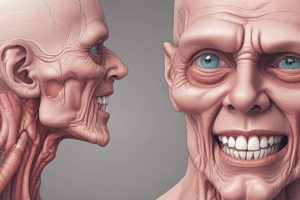Podcast
Questions and Answers
Which of the following lifestyle choices can help prevent oral cancer?
Which of the following lifestyle choices can help prevent oral cancer?
- Eating a diet high in processed sugars
- Receiving a vaccination for human papillomavirus (correct)
- Using a water pipe
- Regular consumption of alcohol
What is the recommended frequency for oral cancer screenings for individuals between the ages of 20 and 40?
What is the recommended frequency for oral cancer screenings for individuals between the ages of 20 and 40?
- Only when symptoms arise
- Every three years (correct)
- Every year
- Every five years
For a patient with oral cancer, how often should regular dental visits be scheduled?
For a patient with oral cancer, how often should regular dental visits be scheduled?
- Every month
- Every 6-12 months
- Every 3-6 months (correct)
- Only when pain occurs
What should a dentist do when encountering a 5 cm non-painful neck swelling in a patient with a history of smoking?
What should a dentist do when encountering a 5 cm non-painful neck swelling in a patient with a history of smoking?
Which of the following is NOT recommended for the prevention of oral cancer?
Which of the following is NOT recommended for the prevention of oral cancer?
What is the most common form of oral mucosal cancer?
What is the most common form of oral mucosal cancer?
Which of the following is a significant risk factor for developing oral cancer?
Which of the following is a significant risk factor for developing oral cancer?
What is the tumor characteristic corresponding to stage T1 in oral cavity cancer staging?
What is the tumor characteristic corresponding to stage T1 in oral cavity cancer staging?
Which diagnostic method is primarily used to assess the extent of a tumor in oral cancer?
Which diagnostic method is primarily used to assess the extent of a tumor in oral cancer?
Which of the following symptoms is NOT commonly associated with oral cancer?
Which of the following symptoms is NOT commonly associated with oral cancer?
Which treatment is typically recommended for localized oral tumors?
Which treatment is typically recommended for localized oral tumors?
What complication is associated with radiation therapy in oral cancer treatment?
What complication is associated with radiation therapy in oral cancer treatment?
Which type of cancer is most commonly found in the tonsils?
Which type of cancer is most commonly found in the tonsils?
Flashcards are hidden until you start studying
Study Notes
Oral Cancer Definition
- Refers to malignant tumors in:
- Oral mucosa
- Tonsils
- Salivary glands
Oral Cancer Epidemiology
- Peak incidence: 55-60 years
- Sex: More common in males (2:1 ratio)
- Most common form of head and neck cancer
Oral Cancer Aetiology
- Oral mucosal cancer: Squamous cell carcinoma (most common), presenting as ulcerative or verrucous growth.
- Salivary gland cancer: Usually mucoepidermoid carcinoma
- Tonsillar cancer: Squamous cell carcinoma (most common, over 70%), lymphoma
Oral Cancer Risk Factors
- Tobacco consumption
- Alcohol
- Chronic mechanical irritation (e.g., poorly fitted dentures)
- Human papillomavirus
- Precancerous lesions (leukoplakia, erythroplakia, erythroleukoplakia)
Oral Cancer Clinical Manifestations
- Halitosis
- Pain
- Dysphagia
- Non-healing ulcer
- Unusual bleeding in the mouth
- Facial swelling
- Lymphadenopathy
Oral Cancer Diagnostic Tools
- Biopsy and histopathology of the lesion
- Panendoscopy: To assess tumor extent
- HPV testing
- Chest x-ray, axial CT: To assess tumor spread
- PET-CT
- Tumor markers
Oral Cancer Stages
- T1: Tumor in the mouth measures 2 centimeters or less.
- T2: Tumor is 2 centimeters or more but not larger than 4 centimeters.
- T3: Tumor is larger than 4 centimeters.
Oral Cancer Management
- Localized tumor: Surgical resection
- Tumors with local spread: Surgery (usually with neck dissection) + radiation therapy, with or without chemotherapy
- Inoperable tumors: Radiation therapy with adjuvant chemotherapy
- Surgical procedures:
- Maxillectomy, mandibulectomy
- Glossectomy, laryngectomy
- Neck dissection
Oral Cancer Complications of Treatment
- Altered oral flora
- Dysphagia
- Candida infection
- Lymphedema
- Mucositis
- Radiation caries
- Stomatitis
- Trismus
- Xerostomia
Oral Cancer Prognosis
- Early diagnosis and treatment usually result in a good curative rate.
- HPV-positive tumors have a good prognosis as they respond better to chemo- and/or radiotherapy.
Oral Cancer Prevention
- Stop smoking, chewing tobacco, or using water pipes
- Stop drinking alcohol
- Use UV-AB-blocking sunscreen on the face and sunblock
- Vaccination for human papillomavirus
- Eat a well-balanced diet
- Have regular dental check-ups.
- Individuals aged 20-40 should have an oral cancer screening every three years
- Annual exams after age 40
Oral Cancer Dental Care
- Regular recall visits (3-6 months)
- Monitor for:
- Recurrence
- Progression
- Recognize complications of treatment
- Monitor for:
Practice Question
- A 60-year-old man with a history of smoking presents with a non-painful 5 cm neck swelling unnoticed before.
- Best course of action: Referral to a medical doctor for further evaluation.
Studying That Suits You
Use AI to generate personalized quizzes and flashcards to suit your learning preferences.




